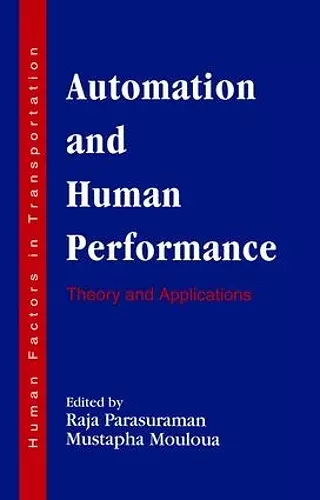Automation and Human Performance
Theory and Applications
Raja Parasuraman editor Mustapha Mouloua editor
Format:Hardback
Publisher:Taylor & Francis Inc
Published:1st Jun '96
Currently unavailable, and unfortunately no date known when it will be back
This hardback is available in another edition too:
- Paperback£62.99(9780367448554)

There is perhaps no facet of modern society where the influence of computer automation has not been felt. Flight management systems for pilots, diagnostic and surgical aids for physicians, navigational displays for drivers, and decision-aiding systems for air-traffic controllers, represent only a few of the numerous domains in which powerful new automation technologies have been introduced. The benefits that have been reaped from this technological revolution have been many. At the same time, automation has not always worked as planned by designers, and many problems have arisen--from minor inefficiencies of operation to large-scale, catastrophic accidents. Understanding how humans interact with automation is vital for the successful design of new automated systems that are both safe and efficient.
The influence of automation technology on human performance has often been investigated in a fragmentary, isolated manner, with investigators conducting disconnected studies in different domains. There has been little contact between these endeavors, although principles gleaned from one domain may have implications for another. Also, with a few exceptions, the research has tended to be empirical and only theory-driven. In recent years, however, various groups of investigators have begun to examine human performance in automated systems in general and to develop theories of human interaction with automation technology.
This book presents the current theories and assesses the impact of automation on different aspects of human performance. Both basic and applied research is presented to highlight the general principles of human-computer interaction in several domains where automation technologies are widely implemented. The major premise is that a broad-based, theory-driven approach will have significant implications for the effective design of both current and future automation technologies. This volume will be of considerable value to researchers in human factors, human-computer interaction, aviation and cognitive psychology, industrial engineering--and related disciplines as well as computer scientists, aeronautical, biomedical, and mechanical engineers. In addition, it should interest others involved in the design and manufacture of automation technologies.
Part I covers broad theoretical perspectives and concepts in automation research. Part II assesses the impact of automation on different aspects of human performance, including monitoring, mental workload, situational awareness, vigilance, decision making, and supervisory control. Aspects of team performance in automated systems are also discussed. Part III examines issues...
ISBN: 9780805816167
Dimensions: unknown
Weight: 1020g
534 pages